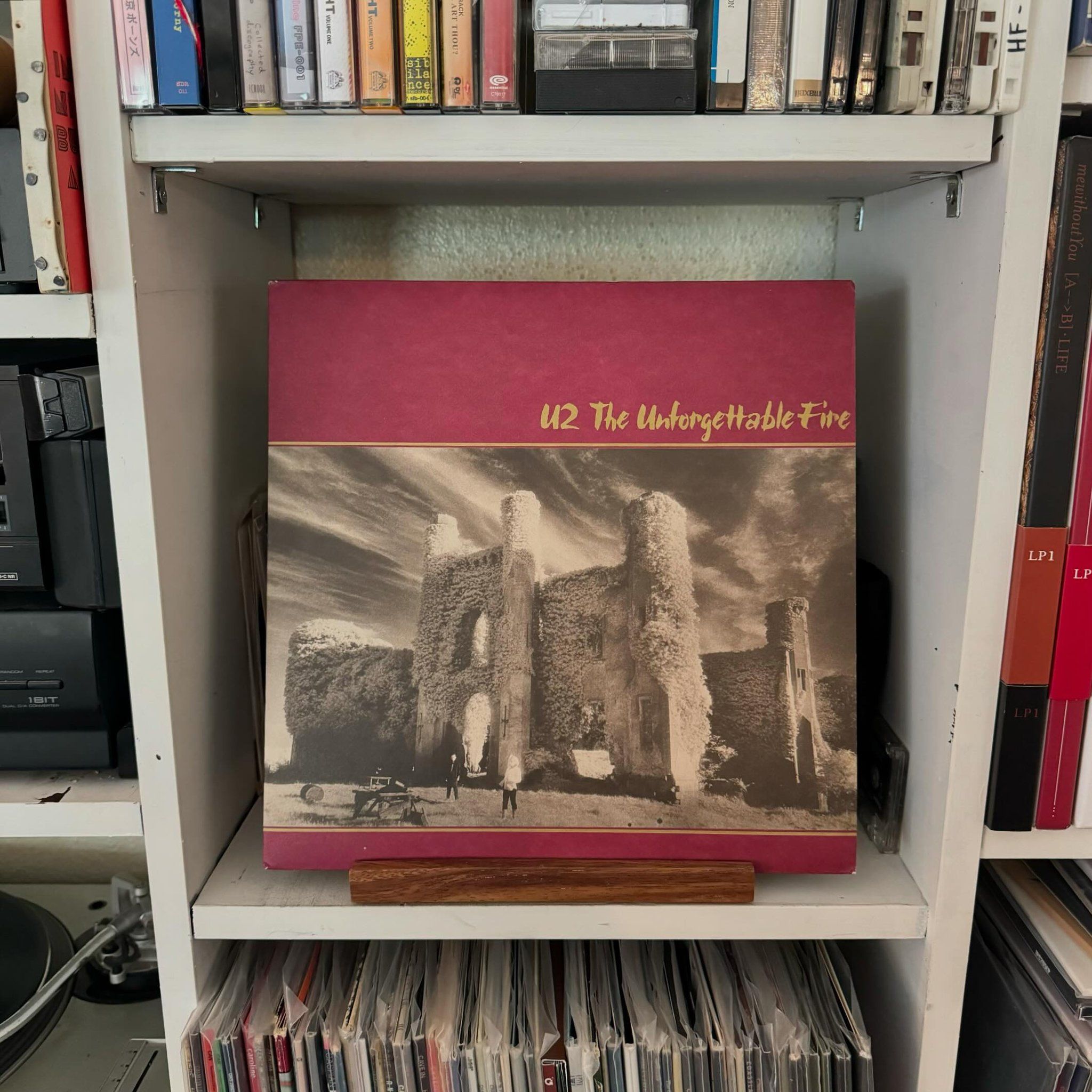
After War its subsequent tour made them into The Next Big Thing, U2 pushed back. Per Bono’s own account, the world was waiting for the next The Who or Led Zeppelin, and it seemed that they were poised to fill ascend to that throne.
But they didn’t want to be “the Next” whoever or other. They wanted to be the first U2. And so they eschewed the throne waiting for them and took a hard left turn instead. They rented a castle and hired Brian Eno and Daniel Lanois to produce (a decision that Bono had to talk both the label and Eno himself into). Eno and Lanois took the sense of atmosphere that had always been a spice on their albums and turned it into a main course.
The resulting album was unlike anything before or since, forecasting shoegaze and post rock in prescient detail. And even in the light of thirty years, The Unforgettable Fire remains the most consequential album they’ve ever made.
It can’t be overstated how bold of a record this was at the time. There had been some ambient moments before (see: “The Ocean,” “Tomorrow,” “Drowning Man,” “40”), but they had always been breaths in between megaphone shouts. After War found them attaining the absolute pinnacle of their brand of direct, arena-sized post punk, taking a turn to the abstract seemed like career suicide.
And on paper, it doesn’t do much to undo that perception. The group rented a castle for a month and only brought three ideas (“A Sort of Homecoming,” “Pride,” and the title track). Eno worked extensively with the Edge’s guitar atmospheres, Lanois workshopped different grooves with Mullens and Clayton, and Bono delved into a newfound fascination with poetry. Many of the tracks were improvised on the spot (“4th of July,” improvised by Adam Clayton and the Edge and recorded in secret by Brian Eno) or intentionally left as sketches (“Elvis Presley and America,” which Bono wrote upon hearing a slowed down version of “A Sort of Comecoming” and intended to revise). Even the most notable songs, “Bad” and “Pride (In the Name of Love),” were considered lyrical sketches by Bono.
But despite its unfinished nature though, there is a magic here that is absent on every other record U2 made. “A Sort of Homecoming” is one of my favorite songs, period. A polyrhythmic drum beat and melodic bass line sway beneath several layers of ambient guitar, creating much of shoegaze’s blueprint. “Pride,” a messianic ode to MLK, is perhaps the first track in their catalog to really establish the U2 sound that would define their career. The title track shows an alternate reality where they follow post-punk peers The Cure into goth rock. A keyboard line and string section fills in the space usually reserved for the Edge’s guitar (that instrument’s role is almost strictly atmospheric, playing harmonics at random) while Bono offers one of the most gloriously 80s melody in his career.”Promenade” pairs a gentle drum beat under some of Edge’s most abstract riffs.
“Bad” sounds like it would be insufferably boring: most of its six-minute runtime is spent bouncing between two chords as it gradually swells to a climax. However, it is one of the finest tracks the group ever put to tape. And notably, the twelve-minute performance at Live Aid wherein Bono pulls a fan out of the crowd and slow dances with her (he had actually saved her from being crushed by the crowd) has been pinpointed by many as the most important turning point in their career.
But even as ambient and abstract as this record is, it maintains plenty of their post punk roots. “Wire,” inspired by frequent Eno collaborators Talking Heads is jagged and intense, is one of the most urgent tracks in their catalog, Bono’s improvised vocals capturing the primal energy of the rhythm section’s urgent funk punk and Edge’s spastic bursts. “Indian Summer Sky” is almost pure, unadorned post-punk, except for all of the reverb on the guitar.
The Unforgettable Fire often feels like it’s treated like a footnote in U2’s career. Many people relegate it to the status of “transitional album,” bridging the gap between their spiky punk roots and the slick sheen of the arena rock they would settle into. But where many transitional records (see also: The Cure’s The Top) offer little more than a snapshot of a band in metamorphosis, The Unforgettable Fire is weird and wonderful in a way that U2 never quite found again. And while, yes, it is a picture of a band in transition, this course correction helped turn them into the U2 they always hoped to become—just like Bono hoped.
On a personal note, it’s hard for me to state exactly what this record means to me. I first came to it after years of ping ponging between War and The Joshua Tree as my favorite. Discovering a record that took the ambient sheen of the latter without losing the post-punk bristle of the former was an absolute revelation. It’s never been far from my turntable—especially the past month, where I’ve listened to it at least once a day. I ordered a cassette copy for my two-year-old to add to her tape collection (which already has a few U2 albums). I purchased a CD copy yesterday to leave in my car stereo. In that time, I’ve recognized that it’s probably the most singularly influential album on my own guitar playing—even without learning any of the specific parts (save for “Bad”). In any case, it remains my favorite record by U2—and sometimes it might even be my favorite record, period.